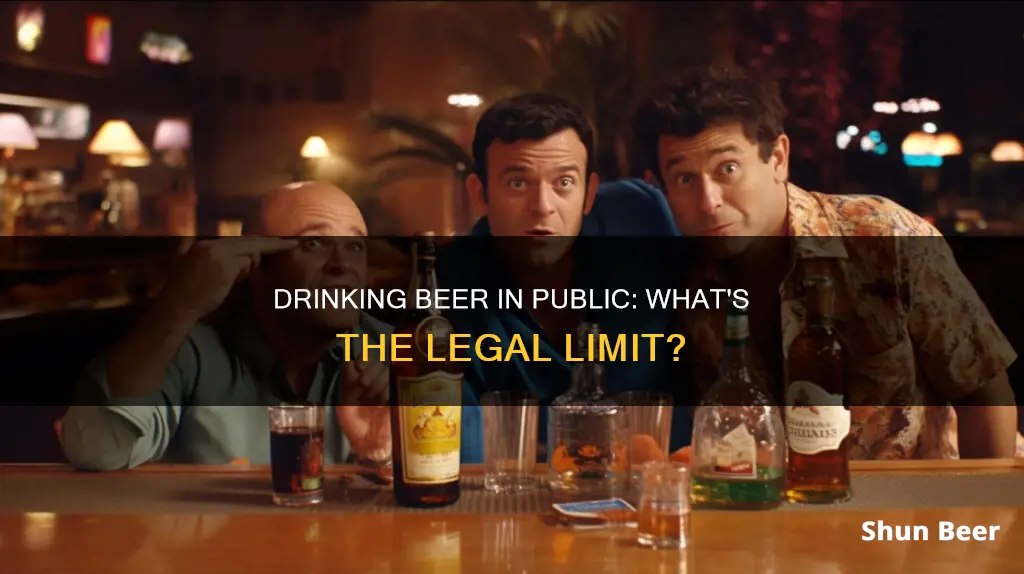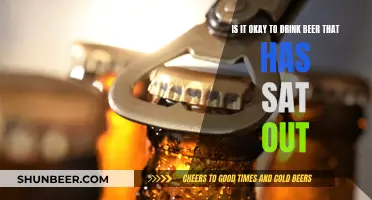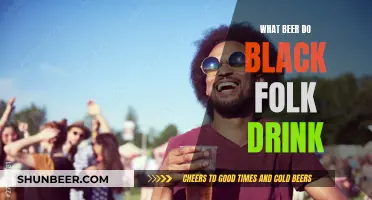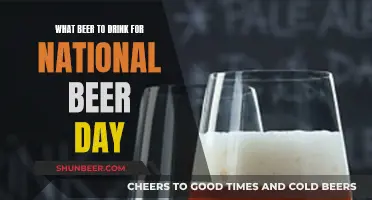
Drinking alcohol in public is a topic that sparks debate worldwide. While some countries, like Norway, Poland, India, Sri Lanka, and certain states in the US, condemn or outlaw it, others, like Denmark, Portugal, Spain, Germany, the UK, and China, find it socially acceptable. The laws and social norms surrounding public drinking vary significantly across the globe, and even within individual countries, as is the case in the US.
Drinking in Public
| Characteristics | Values |
|---|---|
| Countries where drinking in public is widely accepted | Denmark, Portugal, Spain, Germany, the United Kingdom, New Zealand, Japan, Finland, China, Brazil, Belgium, the Czech Republic, France, Switzerland, Italy, Ireland, Singapore, Colombia, India |
| US states with open container laws | Georgia, Louisiana, Missouri, Montana, Nevada, Pennsylvania, Indiana, Oregon, Alabama, Florida, Ohio, Mississippi, Texas, New York, Michigan, North Carolina, South Carolina, Tennessee, Washington |
| US cities where drinking in public is allowed | New Orleans, Las Vegas, Savannah, Butte, Gainesville, Indianapolis, Tampa, Birmingham, Huntsville, Mobile, Montgomery, Tuscaloosa, Hood River, Arlington, Fort Worth, Memphis, Erie, Fredericksburg, Dalton, Gulfport, Kansas City, Sonoma, Cannon Beach |
What You'll Learn

Where it's illegal to drink in public
Drinking in public is largely determined by local laws, and social customs and laws concerning drinking alcohol in public vary significantly from country to country. Here are some places where drinking in public is illegal:
Norway
Drinking in public is illegal in Norway and carries fines. While drinking in parks is quite common, it is not legal. Most police officers will ask the drinker to empty the bottle without further consequences. However, fines as high as 9000 NOK may be issued for public drinking.
Poland
Since 2018, drinking in public has been illegal in Poland as a general rule, and the police take a strict approach to enforcing the law. Municipal authorities may permit it in designated areas.
India
Although drinking in public is unusual on the streets, it is common in certain areas with a bar or wine store. While several people may be drinking on one street corner, it is not typical to openly carry and consume a bottle of alcohol on the streets.
Sri Lanka
Public drinking is almost universally condemned or outlawed in Sri Lanka.
China
While drinking in public is widely accepted in China, certain cities or parts of cities prohibit it. For example, in Hong Kong, drinking alcoholic beverages in public is legal for adults above the age of 18.
Colombia
In 2018, national ordinances effectively banned public alcohol consumption. However, in mid-2019, the Supreme Court overturned these ordinances, restoring the freedom to consume alcohol in public.
Romania
Drinking in public is illegal in Romania, except in certain designated spaces, such as events organised for New Year's Eve celebrations or the promotion of food or non-food products.
Russia
According to Article 20.20 of the Code of Administrative Offences of Russia, drinking in a place where it is forbidden is punishable by a fine of 500 to 1500 rubles. Article 16 of the Federal Law No. 171-FZ prohibits drinking in almost all public places, including residential buildings' entrance halls, staircases, and elevators.
Slovakia
Drinking alcoholic beverages in public is illegal in many Slovakian cities and punishable by a fine of up to 33 EUR. However, this rule is not always respected.
Mexico
Drinking in public is mostly illegal in Mexico, although certain spots, such as tourist zones in Cancun, are more lenient or tolerant within the law. While public drinking is banned, it is socially accepted and tolerated by authorities in certain neighbourhoods, communities, or localities.
United States
In the United States, open container laws vary by state. While drinking in public is illegal in most jurisdictions, some places and circumstances permit public alcohol consumption. These include cities like New Orleans, Las Vegas, Atlantic City, Indianapolis, and Gainesville, Florida, as well as the state of Wisconsin, certain college campuses, and specific sporting events like tailgate parties.
Breastfeeding and Beer: Is It Safe to Drink Alcohol?
You may want to see also

Where it's legal to drink in public
Drinking alcohol in public is legal in some countries, such as:
- Austria: The possession and consumption of open containers of alcohol are legal for those of the legal drinking age.
- Brazil: Having an open container is legal, and drinking in public is socially accepted.
- Belgium: Drinking in public is legal, but some cities have local ordinances that make it illegal in certain areas.
- Canada: Quebec's laws on drinking in public are more relaxed than in the rest of Canada.
- China: Drinking in public is widely accepted and there are no laws against it.
- Colombia: Public drinking is legal and culturally accepted.
- Czech Republic: Drinking in public is generally legal, but communities can restrict it through ordinances.
- Denmark: Drinking in public is legal, as long as it does not disturb public law and order.
- Finland: Drinking in public parks is exempt from the law as long as it does not cause undue public disturbance.
- France: Public drinking is legal, but local laws may ban it in certain areas or at certain times.
- Germany: Public drinking is socially acceptable.
- Hong Kong: Drinking in public is legal for adults above the age of 18.
- Hungary: Drinking in public is generally legal, but some municipalities have local laws banning it.
- Japan: There are no laws forbidding public drinking, which is a common custom in cities and parks.
- Laos: There is no open container law, and the legal drinking age in public is 18.
- Latvia: Drinking in public is legal since 2020, but some cities still classify it as an administrative offense.
- New Zealand: Public drinking is legal, although local authorities can declare liquor-free zones.
- The Republic of Ireland: There are no laws against public drinking, except that alcohol in a closed container cannot be consumed within 100 metres of the off-license where it was purchased.
- Singapore: Drinking in public is legal, but there are time restrictions and a permit is required during restricted hours.
- Switzerland: Public drinking is legal, but there are some location-based restrictions.
- The United Kingdom: Public drinking is socially acceptable, and it is legal in England and Wales.
- The United States: While drinking in public is illegal in most jurisdictions, there are some places and circumstances where it is accepted, such as New Orleans, Las Vegas, and certain college campuses.
Coffee and Beer: Mixing Drinks, Safe or Not?
You may want to see also

Where people tend to look the other way
While drinking in public is illegal in most jurisdictions in the US, there are some places where people tend to look the other way. These places generally require drinkers to use plastic cups or paper bags to avoid broken glass on the streets.
In New Orleans, for example, you can drink on the street as long as your beverage is in an open plastic container. However, open containers are forbidden in moving vehicles, except during Mardi Gras season.
Other cities with similar relaxed attitudes towards drinking in public include Las Vegas, Savannah, and Butte. In Savannah, you can carry a beverage that's 16 ounces or less, and in Butte, drinking is only prohibited between 2 am and 8 am.
Some states, like Indiana, have no restrictions on carrying open containers of alcohol on public premises, as long as it's in the original container.
In some states, like Mississippi, there is no state-wide law against public drinking, and in others, like Illinois, there is no penalty for public drunkenness.
In Texas, cities like Fredericksburg, Arlington, and Fort Worth don't have a ban on public drinking.
However, it's important to note that local ordinances may vary, and it's always a good idea to double-check the local laws before partaking in public drinking.
Drinking Beer with Propranolol: What You Need to Know
You may want to see also

Where there's no statewide ban
In the United States, there is no federal law prohibiting drinking in public, and the laws vary from state to state. While many states have banned drinking in public spaces statewide, some states do not have a specific law on the books, and others allow their municipalities to decide whether and how their citizens might imbibe publicly.
States with No Statewide Ban
The following states do not have a statewide ban on drinking in public:
- Georgia: While local jurisdictions largely prohibit public drinking, it is permitted in the Savannah Historic District of downtown Savannah and, oddly enough, the North Georgia town of Dalton.
- Louisiana: The city of New Orleans allows the possession and consumption of any alcoholic beverage in an open plastic container or plastic cup. Open containers are, however, forbidden in moving vehicles, except during Mardi Gras season.
- Montana: The city of Butte allows drinking anything, anywhere, although there is a ban between 2 am and 8 am. Elsewhere in Montana, drinking in the street is allowed during the other 18 hours of the day.
- Nevada: While local law governs open container laws, and public drinking is illegal in many places, you are able to carry a drink with you on the Las Vegas Strip—as long as it's in a plastic, paper, or aluminum container.
- Pennsylvania: While it is illegal to drink in public in many places, you can drink in public parks (and other public spaces) in Erie.
- Indiana: There is no restriction on carrying open containers of alcohol on public premises. You can keep your drink in its original container, although local ordinances may not allow this, and the alcohol-serving business may not either.
- Mississippi: There is no state-wide law against public drinking and no open container laws. However, public intoxication is a crime, so you can still be arrested if you get too drunk.
- Alabama: Public drinking is permitted in select Entertainment Districts, including Birmingham, Huntsville, Mobile, Montgomery, and Tuscaloosa. However, these districts come with extra stipulations: in Mobile, for example, you must have "open plastic containers with a commercially printed name and/or logo of a designated licensee."
- Florida: Generally, it is illegal to consume alcohol in public in Florida. However, the city of Tampa allows up to two drinks in plastic containers per person on the Tampa Riverwalk as long as they are purchased from a licensed facility between the hours of 11 am and 1 am.
- Colorado: You're allowed to drink alcohol in public areas such as state or city parks, but drinks must contain 3.2% or less alcohol by volume (or ABV).
- Ohio: Since 2015, Ohio has allowed cities to create a limited number of "designated outdoor refreshment areas" (DORA) where alcoholic beverages are permitted. Cities that have created these districts include Canton, Delaware, Hamilton, Lancaster, Logan, Lorain, Middletown, and Toledo.
- Michigan: In 2020, Michigan allowed cities to grant social district permits for the open consumption of alcohol.
- New Jersey: In 2020, New Jersey made public drinking allowed in tourist spots such as the beach and boardwalk of Atlantic City.
- Idaho
- Wyoming
- North Dakota
- South Dakota
- Wisconsin
- Illinois
- Michigan
- North Carolina
- Delaware
- New Hampshire
- Vermont
- Maine
- Alaska
Antibiotics and Alcohol: One Beer, Any Harm?
You may want to see also

Where there are local ordinances
In Belgium, some cities such as Antwerp and Brussels have local ordinances that make drinking alcohol in public spaces illegal. These laws are mostly limited to specific areas like major squares or streets near the city centre. Although these laws are not always enforced, they can result in fines of up to €350.
In the Czech Republic, while drinking in public is generally legal, each community is entitled to restrict public drinking by ordinance. As a result, some towns and cities have forbidden drinking in public spaces to prevent disorderly conduct and begging.
In Italy, there are no national laws against drinking in public, but local municipalities can issue regulations prohibiting public drinking in certain locations or during specific times. Local regulations must also set the fines for offenders.
In the United States, open-container laws are state laws, and they vary across states. Some states, like Indiana, have no restrictions on carrying open containers of alcohol on public premises, while others, like Mississippi, have no state-wide law against public drinking and no open-container laws. However, public intoxication is a crime in Mississippi, and you can be arrested if you become intoxicated in public.
Some states, like Alabama, only allow open containers in certain cities or select entertainment districts. For example, in Mobile, Alabama, you must have "open plastic containers with a commercially printed name and/or logo of a designated licensee."
In summary, while some countries and states have more relaxed laws regarding public drinking, it's important to be aware of local ordinances that may restrict this activity in certain areas or during specific times. Penalties for violating these laws can range from fines to jail time, so it's always best to check the local regulations before consuming alcohol in public spaces.
Beer and Shraddha: A Spiritual Conundrum for Devotees
You may want to see also
Frequently asked questions
It depends on the state and city you are in. Some states, like Mississippi, do not have a law against public drinking, while others, like Washington, do. Even within states, local ordinances may vary, so drinking in public may be allowed in some cities but not others.
Here are some places in the US where you can drink in public:
- Fredericksburg, Texas
- New Orleans, Louisiana
- Indianapolis, Indiana
- Las Vegas, Nevada
- Butte, Montana
- Erie, Pennsylvania
- Hood River, Oregon
- Gulfport, Mississippi
- Arlington, Texas
- Fort Worth, Texas
Open container laws are laws that prohibit drinking alcohol in public by limiting the existence of open alcoholic beverage containers in certain areas. These laws vary from state to state in the US and may also depend on local ordinances.
Penalties for drinking in public where it is illegal can range from fines to jail time, depending on the jurisdiction.







